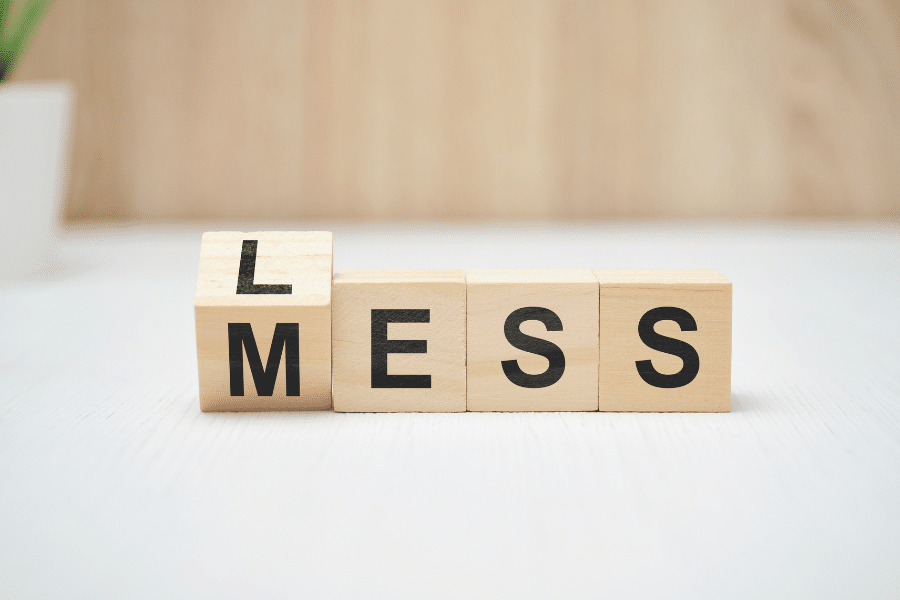Often associated with physical spaces, the concept of decluttering extends beyond tidying desks and organising files. It can encompass shedding old habits, outdated mindsets, and inefficient problem-solving methods. Embracing a decluttered work life can transform productivity, creativity, and well-being.
In the article we explore the benefits of decluttering your work life along with some tips for getting started.
1. Enhancing Focus and Productivity
One of the most immediate benefits of decluttering your work life is enhancing focus and productivity. Clutter, whether physical or mental, can be a constant source of distraction. A disorganised workspace can lead to wasted time searching for documents or tools, while mental clutter—such as unhelpful habits (think doomscrolling!) and unproductive thought patterns—can drain your cognitive resources.
The Physical Space: By organising your workspace, you create an environment conducive to concentration. A minimalist setup reduces visual distractions, allowing you to focus more intently on the task at hand.
Mental Clarity: Similarly, decluttering your mind by letting go of old habits and ineffective methods enables you to approach tasks more clearly. This mental space fosters quicker decision-making and more efficient problem-solving.
2. Fostering Innovation and Creativity
Clinging to old ways of thinking and working can stifle innovation. The ability to adapt and think creatively is crucial in a rapidly evolving professional landscape.
Breaking Free from the Rut: Decluttering your work life involves questioning habitual processes and exploring new approaches. This break from routine can stimulate fresh ideas and innovative solutions.
Embracing Change: By discarding outdated mindsets, you become more open to experimentation and risk-taking. This openness is essential for fostering creativity and driving innovation within your work environment.
4. Improving Mental Health and Well-Being
A cluttered work life can contribute to stress and burnout. The constant presence of unfinished tasks, disorganised spaces, and mental chaos can weigh heavily on your mental health.
Reducing Stress: A tidy workspace and a clear mind can significantly reduce stress levels. Knowing exactly where everything is and having a structured approach to your tasks can create a sense of control and calm.
Promoting Work-Life Balance: Decluttering also involves setting boundaries and prioritising tasks. By focusing on what truly matters and letting go of non-essential tasks, you can achieve a better work-life balance, contributing to overall well-being.
4. Boosting Efficiency and Effectiveness
Cluttered systems and processes often compromise efficiency. Decluttering encourages a reassessment of work processes, leading to more streamlined and effective operations.
Optimised Processes: Evaluating and updating workflows can eliminate redundancies and improve efficiency. This optimisation ensures that resources are used effectively, saving time and effort.
Enhanced Collaboration: Decluttered communication channels and project management tools foster better collaboration. Clear and concise information sharing prevents misunderstandings and improves team productivity.
5. Facilitating Personal and Professional Growth
Holding on to old habits and mindsets can impede personal and professional development. Decluttering allows for continuous growth and learning.
Self-Reflection and Awareness: Decluttering requires introspection. Examining your habits and mindsets can help you become self-aware and identify areas for improvement. This reflection is a key component of personal growth.
Adaptability and Learning: Embracing new ways of working and thinking fosters adaptability. In business, the ability to learn and adapt is a valuable skill. Decluttering promotes a growth mindset, which is essential for long-term success.
Practical Steps to Declutter Your Work Life
- Evaluate Your Physical Workspace: Organise your desk, files, and digital spaces. Keep only what is necessary and valuable. Invest in storage solutions to maintain order.
- Assess Your Work Habits: Identify habits that no longer serve you and replace them with more efficient practices. For instance, if checking emails constantly disrupts your workflow, designate specific times for email management.
- Challenge Your Mindset: Reflect on your beliefs and attitudes towards work. Are there any outdated notions holding you back?
- Simplify Processes: Review your workflows and identify areas for simplification. Streamline communication, project management, and other processes to enhance efficiency.
- Set Clear Goals and Priorities: Establish clear objectives and prioritise tasks that align with your goals. This focus prevents you from spreading yourself too thin and ensures meaningful progress.
- Regularly Review and Adjust: Decluttering is not a one-time task. Review your workspace, habits, and mindsets regularly and adjust as necessary to maintain a clutter-free work life.
Conclusion
Decluttering your work life is a practice that goes beyond organisation. It involves shedding old habits, mindsets, and ways of solving problems to create a more efficient, innovative, and balanced professional existence.
By enhancing focus, fostering creativity, improving mental health, boosting efficiency, and facilitating growth, decluttering paves the way for a more productive and fulfilling work life. Embrace the benefits of a decluttered work life and unlock your full potential.
This article was originally published on our sister site lawcadia.com.

